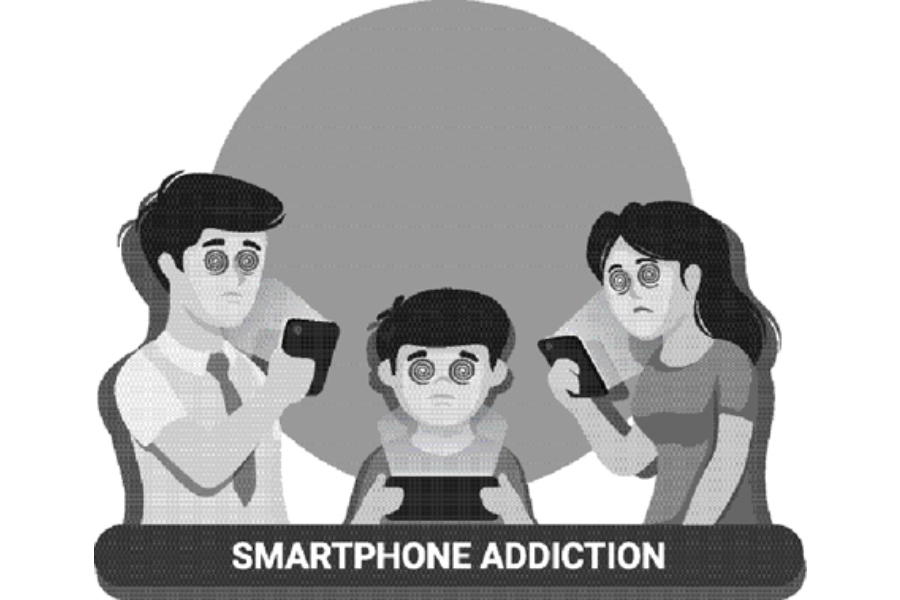
Published :
Updated :

The growing addiction to smartphone use, video games, and internet-based lifestyles, particularly among children and young adults, poses an unprecedented threat to the family as a cohesive unit and its integral role within the broader society. Apparently, the surge of smartphones has caught society unaware, leaving it no time to put in place a proper defence. A recent, tragic incident in Chuadanga, where a 17-year-old boy fatally stabbed his father over the confiscation of his mobile phone over excessive gaming, is a glaring and horrific example of the deep-rooted crisis of smartphone addiction. This heartbreaking event underscores the dangerous consequences of unchecked digital addiction and its devastating impact on individual families in particular, and society at large.
Smartphone addiction is now widespread, and equally prevalent in urban centers and rural villages. It is commonplace to observe youths and teenagers from diverse backgrounds engrossed in their smartphones. Unlike substance abuse, this addiction is performed openly, in full view of all. Parents can only hope their children would dedicate a similar focus to their studies. While smartphones and the internet have undeniably brought immense benefits to people's lives, their harmful side effects are becoming increasingly visible. The excessive use of smartphones has far-reaching and devastating consequences for both young and old, with unsuspecting children bearing the brunt of these negative impacts.
It is true mainly because many do not know where to strike the balance. Excess of anything is bad and it holds true for one's love for technology. Our growing fascination for Facebook and other Internet-related activities is keeping many of us glued to the computer, mobile phone, or tablet screens for hours together every day. The most immediate casualty of this excessive engagement is our valuable time. Then comesits impact on the family bonds as children and even adults increasingly prioritise their gadgets leading to a sense of alienation from parents and siblings. Children are growing up without learning appropriate social skills which come from interactions with family, friends, and neighbours. They feel more comfortable in the privacy of their rooms, cut themselves off from the outside world, and watch cartoons, play video games, or surf the net for hours without talking with or seeing real people. As a result, today's youths are facing significantly higher levels of anxiety, depression, self-harm, and other related disorders compared to any previous generation.
A recent study conducted by researchers from Jahangirnagar University focuses on the impact smartphone usage has on children in Bangladesh. The research reveals that parents who spend three or more hours daily on smartphones significantly increase the likelihood of influencing their children to develop such an addiction. Parental behaviour in shaping children's behaviour is a deciding factor. Parents' tendency to hand over their smartphones to their children as a quick fix to pacify them or to keep them occupied while they attend to other tasks has worsened the situation.
Shockingly, the research claims children who are addicted to smartphones are 500 times more prone to mental health issues and 230 times more susceptible to physical health problems compared to their non-addicted counterparts. This addiction inflicts a range of adverse effects on the physical and mental well-being, as well as the cognitive development of preschool-aged children, especially. Developing mental disorders is just one facet of the overuse of smartphones.
Another growing threat is the exposure to pornography. It is probably the scariest aspect of unchecked Internet access that has no surefire remedy. Likewise, information overload, the growing burden of fake news, and the lure of terrorism and extremism are constantly tugging impressionable minds towards the dangers of brainwashing and confusion. The health hazards posed by smartphone addiction cannot be ignored. Disruption of sleep, lack of concentration, damage to memory capacity, loss of reading skills, and the detrimental effects of radiation on health are some of the more serious fallouts of using smartphones for long hours. We may not know about the full scale of harm being done to mind and body until more time has elapsed. Already, there is a marked rise in the number of children requiring glasses. Parents are rushing to doctors with various concerns stemming from excessive screen time. However, the solution ultimately lies in their hands.
A study published in the International Journal of Mental Health and Addiction in 2024 highlighted a crucial aspect of child development: children learn by observing and imitating their parents' behaviour. Consequently, if parents exhibit excessive smartphone use, their children are at a higher risk of developing a similar addiction. However, a particularly alarming aspect of this issue is that many parents either fail to recognise their child's growing dependence on digital devices in its early stages or simply do not give it adequate attention. By the time they do, it is often too late.
In the face of this mounting crisis, it is imperative for parents, educators, and policymakers alike to work harmoniously to address the issue of smartphone addiction by both children and adults. Parents must act by example and ensure they are not overusing smartphones themselves and are giving adequate time to their children, helping them with their homework, taking time to listen to them (however boring it might be) etc. Limiting smartphone usage will not be easy, but it is not impossible either. Parents ought to discipline themselves first and then their children. Teach by example. Initially, it will be challenging, but with determination, they can overcome the urge to constantly keep checking the phone or to give it to their child out of habit. It will help them gain more control over their time and become more involved with beneficial activities rather than being a slave of electronic device.


 For all latest news, follow The Financial Express Google News channel.
For all latest news, follow The Financial Express Google News channel.